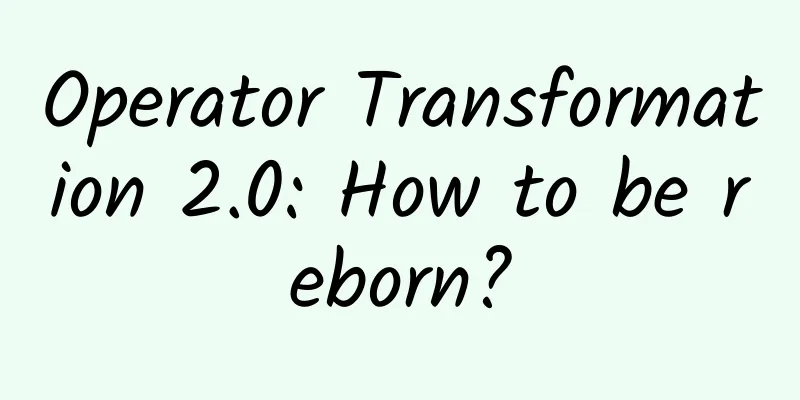Operator Transformation 2.0: How to be reborn?

|
2014 was a special year for the domestic communications market. On the one hand, the operators' 4G network construction was in full swing, and the 4G business volume and number of users were rising steadily; on the other hand, the situation of operators was not optimistic. They were facing market competition and squeeze from OTT applications and service providers externally, and the dual pressure of "business tax to value-added tax" and marketing cost compression internally. In this year full of opportunities and challenges, the communications market was full of various contradictions - the contradiction between traditional concepts and the new competitive environment, the contradiction between the decline of traditional businesses and the rise of new businesses, etc. Operators who were busy "reducing water" and "maintaining indicators" were inevitably confused and anxious about the future. Where should the transformation of operators go? Operators have all strengthened their transformation strategies Under the impact of the mobile Internet wave, the current basic communications market is facing severe challenges. Although the total business volume and business revenue have been rising steadily, the year-on-year growth rate has continued to decline, and the decline rate has hit a record high in recent years; from the perspective of traditional business, the average local and long-distance mobile communication outgoing call minutes have fallen by 6.6% and 5.0% year-on-year respectively. After entering 2014, the SMS business has been in a state of collapse, with the year-on-year decline remaining above 18%, and even close to 20% in some months; from the perspective of business revenue structure, the proportion of voice business revenue has dropped from 46.6% in the middle of last year to 42.9% in the middle of this year. The growth of traffic business in non-voice business revenue has played a huge role, but the mismatch between volume and revenue is very obvious. It can be seen that the overall pattern of the communications market is undergoing fundamental changes. Based on the current situation, the three major operators have all proposed a "transformation" strategy in their target strategies for this year. Xi Guohua, chairman of China Mobile, pointed out that operators have accelerated into the era of "traffic management", competition at the traditional operator level has become more intense, and the "heterogeneous substitution" of traditional telecommunications services at the Internet level has also accelerated. China Mobile is in a stage of "maintaining the value of traditional business operations" and "accelerating the transformation and development". China Telecom Chairman Wang Xiaochu further emphasized the "new three" strategy centered around deepening transformation and the goal of "rebuilding a new China Telecom," namely, promoting the "one de-telecom," "marketization and differentiation," and the "new three" transformation strategy. Chairman Chang Xiaobing of China Unicom also regards transformation as the top priority for the company's future development. He has fully implemented the strategy of "mobile broadband leadership and integrated innovation" and put into practice four "insistences": insist on seeking better results in speed, continuously accelerate the development of scale benefits; insist on keeping pace with the times, continuously promote corporate innovation and transformation; insist on market-driven, continuously stimulate the vitality of the system and mechanism; insist on customer orientation, and continuously enhance service support capabilities. Transformation should be “people-oriented” "Transformation" has become a common and urgent need for the three major operators, and has been elevated to a very high strategic position. The operators' past thinking patterns and actions are no longer compatible with the current mobile Internet market, as shown in the following aspects. The contradiction between traditional operation concepts and the new competitive environment. The traditional communications market is a "single" competitive market. First, the competitors and business types are single, limited to the three major operators, fixed communications and mobile communications services; second, the value model is single, and value is obtained through the model of "operator service activation and delivery, consumers calculate call bills and pay according to usage and service pricing". In the new competitive environment, competitors emerge in an endless stream, and the value model also shows a trend of diversification and generalization. "The wool comes from the sheep" is no longer the only model, and the value model of "the wool comes from the dog, and the pig pays" is common. The contradiction between self-centered and customer-centered operating concepts. In the past, operators controlled the design, pricing and provision of services, and consumers could only choose from the services they provided. This model made operators the core controllers of the value chain and also cultivated a self-centered mindset. However, the mobile Internet era emphasizes user experience rather than the product itself. User experience has formed an attention economy and new user value. The quality of user experience determines user stickiness and word-of-mouth communication. This is precisely the weakness of operator products. Once they can no longer become a rigid demand of consumers, how can they compete with OTT application services? The contradiction between static operation strategy and dynamic market changes. Previously, because operators occupied a controlling position in the value chain, their operation strategy was "one trick to dominate the world". If that didn't work, they would use low-price competition to grab the market. This is also the reason why vicious competition has repeatedly appeared in the campus market and the homecoming market in recent years. The mobile Internet market is in a dynamic change. Faced with the experience-first and wild growth of new competitors, the operators' response measures seem pale and weak, irrelevant, and even at a loss and let it go. The contradiction between focusing on market analysis and focusing on customer experience. Under the limitations of traditional thinking patterns, operators' strategy formation is still conservative. The most important source of market strategy is business analysis. In the past, operators had the dominant power over the market and value chain. Business analysis mostly presented, analyzed, compared, and summarized their own data, and based on this, they came up with strategies for the next stage. This method seems to have rich and comprehensive data and in-depth and thorough analysis, but in fact it is to find experience from the inside, from the self, and from the past to guide future market development. Little do people know that the golden rule in the mobile Internet era is "the richer the past experience, the faster you die now." Without analysis of the outside, the market, and customers, and not looking for directions from the future, the path will naturally become narrower and narrower, and life will become more and more passive. The contradiction between empiricism and innovative thinking. Faced with new challenges, operators have also begun to reflect on their thinking and change their behavior. "Innovation" has also become a catchphrase for operators, but innovation is easier said than done. In today's world where "when the tide recedes, you will know who is swimming naked", as the "water level" gradually decreases, the future of operators is full of embarrassing uncertainty. If decision-makers at all levels cannot reflect on and change themselves, they will inevitably fall into a dilemma of being completely "dumb pipes" in the future. By then, how can operators who have completely lost their voice in the value chain compete with new competitors? In summary, the current pressure on operators is unprecedented and the prospects are full of challenges. So how can operators achieve transformation? The author believes that transformation should be "people-oriented": on the one hand, the focus should be shifted outward, that is, focusing on the market and consumers, respecting and complying with market rules, and strengthening and guiding user experience; on the other hand, the focus should be shifted downward, changing the past centralized decision-making method to a hybrid decision-making method that combines centralized and decentralized decision-making, appropriately tilting decision-making power to grassroots organizations, listening more to the voices of the grassroots, and less top-down work guidance and KPI indicators that are out of touch with reality. Transformation needs to go beyond the scope of the traditional communications market Faced with challenges, operators have unanimously proposed transformation strategies, the essence of which is to reposition the position of operators in the new value chain, better adapt to and promote the harmonious development of all parties in the value chain, and even build a new value chain and value model that is different from traditional businesses. Judging from the effectiveness of the implementation of the transformation strategy, whether it is China Telecom's innovation incubation base, the bold trial of Yueme Box, or China Mobile's Internet company and Migu Company's plans to be listed and operated, their rhythm and speed are "half a beat" slower than the market evolution, and there is no substantial breakthrough in the transformation speed. There are two main reasons for this: first, the operators' calm style and lengthy operation process are different from the "short, flat and fast" style of mobile Internet; second, there are no very successful cases to learn from, and operators are cautiously "crossing the river by feeling the stones". How to achieve model transformation? In fact, if we look beyond the scope of the traditional communications market, we can see cases worth pondering from new competitors. Provide high-quality industry platforms and control the rules of the game Apple's industrial platform is centered on hardware and software systems, while Tencent's WeChat is centered on the "WeChat complex". WeChat is not only an instant messaging tool, a social networking platform, but also an e-commerce and mobile payment platform. Now combined with the WeChat phone book function, it has the attributes of a mobile communication tool. The platforms of Apple and WeChat are both open and closed. Open means that they are open to all partners who recognize and follow the platform rules formulated by Apple and Tencent, and are open in terms of business introduction, provision, use and background support; closed means that these two ecosystems are mainly oriented to their own user groups, and the user groups of major competitors cannot directly participate in the ecological environment. The current product systems of operators are fragmented and each is fighting for its own business. There is still a long way to go from providing services to providing platforms. Fortunately, operators currently have two unique advantages: one is the basic communication capability of full network coverage, which is the basic capability of all mobile Internet services. Operators can build various capability platforms based on this, and can also realize the storage and distribution of services, billing and collection, etc.; the second is the huge user base and the data generated by these user groups. Of course, the key to activating user resources lies in the modeling and analysis of user groups. How to effectively outline the user "profile" and start from the two aspects of demand identification and guidance, solution design and provision is the current difficulty. Encourage all kinds of innovation with an open mind The driving force for the sustainable development of Apple and WeChat ecosystems is a huge user base. How do they attract and maintain these user bases? On the one hand, they continuously improve and innovate themselves. For example, the iPhone series is constantly upgraded and optimized in hardware systems (such as fingerprint recognition) and iOS operating systems, and WeChat is also constantly expanding platform functions to keep its platform alive. On the other hand, they encourage business providers to continuously improve and innovate, and enable partners to provide various personalized services by opening various business and service interfaces. For example, Ctrip, eLong, etc. can provide users with business inquiries, points inquiries, simple business subscriptions and other services through WeChat official accounts. The continuous innovation of partners is actually the continuous innovation of the WeChat complex, which is also an important means for it to maintain its vitality. Operators have previously sought business cooperation through open interfaces. For example, a few years ago, SP/CP business developed on a large scale, but it eventually turned into a gust of "money-making" behavior, which caused many complaints and criticisms from consumers. The main reason was the loss of control of business rules and the lack of sustainable innovation. This time, China Mobile established an Internet company and Migu Company, and it must work hard on rule-based and sustainable innovation, otherwise it may just be another SP/CP access platform. Seeking new growth points through diversification and generalization of value models The diversification of value models is one of the biggest features of the mobile Internet. Forward charging is no longer the only means of profit. Take the great success of "WeChat red envelopes" during the Spring Festival this year as an example. With the help of the traditional custom of "distributing red envelopes and making red envelopes" during the Spring Festival, the key link of mobile payment, the WeChat payment platform and the user's bank account, was quickly completed, laying the foundation for the next step of the development of WeChat payment and Weidian e-commerce platform. Although in this process, the WeChat platform does not directly charge consumers any business and service fees, it can create profits through backward charging, third-party payment, business cooperation and other means. The single value model of operators has always been a problem, but in recent years, some breakthroughs have been made in value model innovation. Take the "800 Traffic" business model of China Mobile and China Unicom as an example. This method of charging backward and free forward can achieve a win-win situation for partners and consumers. However, in terms of the intensity and breadth of exploring value model innovation, operators still need to speed up their pace. The application of mobile Internet is constantly encroaching on the survival and development space of operators and constantly occupying new heights in the value chain. Compared with "winning in stability", "speed is the only way to win" is the king of the mobile Internet world. Consolidate platform advantages and accelerate expansion and extension "Wild growth" and rapid expansion are the biggest characteristics of mobile Internet companies, which can be seen from the development trajectory of WeChat. From the threat of MiChat to the birth of WeChat, from personal communication and social behavior of users to public service accounts, from communication platforms to e-commerce and mobile payment platforms, WeChat always launches impact and expansion into the next field without stopping after gaining a firm foothold, and the speed and effect are astonishing. This is especially worth learning from for operators. For example, when China Mobile's Fetion and China Telecom's Wing Chat were launched, the industry and the industry had high hopes for them, but they eventually became "second-tier brands". The reason for this is that after the business was successfully put on track, it was unable to expand and break into new areas, and there were also factors that they were self-satisfied and used the thinking method of operating communication products to operate new businesses. Now the three major operators are once again standing at a new starting point in a new field. On the one hand, they need to think about how to extend and maintain the original accumulated advantages, and on the other hand, they must actively seek expansion in new areas - if the operators do not have the courage to "revolutionize" their past "life", naturally someone will come to "revolutionize" the operators' "life". This is the cruelty of the mobile Internet era, but it is also an opportunity in the mobile Internet era! On the one hand, the operators' past steady style and lengthy processes are not suitable for the "short, flat and fast" pace of the mobile Internet. On the other hand, due to the lack of cases to learn from, operators are cautious in their transformation. To successfully transform, operators need to abandon traditional models and look beyond the scope of the traditional communications market. As a winner of Toutiao's Qingyun Plan and Baijiahao's Bai+ Plan, the 2019 Baidu Digital Author of the Year, the Baijiahao's Most Popular Author in the Technology Field, the 2019 Sogou Technology and Culture Author, and the 2021 Baijiahao Quarterly Influential Creator, he has won many awards, including the 2013 Sohu Best Industry Media Person, the 2015 China New Media Entrepreneurship Competition Beijing Third Place, the 2015 Guangmang Experience Award, the 2015 China New Media Entrepreneurship Competition Finals Third Place, and the 2018 Baidu Dynamic Annual Powerful Celebrity. |
<<: Behind the ban on Kuaishou: the crisis and fear of the WeChat platform
>>: What exactly is the problem with Meizu phones?
Recommend
For WeChat editors, how can you write social copy that will increase rapidly in forwarding!
Copywriting in the WeChat era is really tiring an...
[Latest opening] The latest fluorescent cloud new project, receive unlimited coupons, daily income of 300+
[Latest opening] The latest fluorescent cloud new...
Case + Method: How to build a user growth system for cash loan products
By using the fission method to build a growth sys...
The most comprehensive manual in history: Complete guide to APP promotion and operation
[[124859]] via:appying In the mobile Internet ind...
Tik Tok Marketing Tips: Comprehensively Understand the Star Map Platform!
What is Star Chart Platform? In September 2017, t...
337 billion US dollars! Report says that by 2025, 5G mobile phones will account for more than 50% of smartphone sales revenue
A new study from Juniper Research found that 5G-c...
Will Tilt Brush, which instantly transforms you into Ma Liang with the magic brush, be the killer application in the non-gaming VR field?
If you have seen the promotional video for Micros...
Weibo operation skills: How to harvest Weibo traffic?
Weibo, more and more people are gathering to watc...
Meituan Operations: 6 strategies for [Meituan Takeaway Membership]!
Today I want to share a project with you, which i...
The faster the speed, the slower the time. What would happen if we flew close to the speed of light?
According to the time dilation effect of relativi...
Operation and promotion: How do Pinduoduo, Xinshixiang, etc. achieve fission?
In the second half of 2018, there were fewer conc...
Red panda, raccoon, civet cat, who is the real "Instant Noodle King"?
Speaking of snacks that we have had since childho...
Spring Festival Marketing: Focus on Online, Breakthrough Offline
Despite the impact of the epidemic, the Spring Fe...
Waymo partners with car rental giant Avis to provide self-driving cars as a service
According to Reuters, Alphabet's self-driving...
APP advertising promotion monetization methodology!
Whether playing King of Glory, reading articles o...









